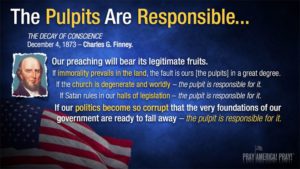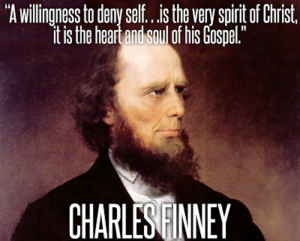This man nearly single-handedly made
America a godly nation: But which god?
Many in American Christendom have this yearning to return America to its godly roots, away from its current anti-God philosophical societal self-destruction. However, I have heard no one describe this godly America they so nostalgically yearn to reimplement. Charles Finney, the Great Revivalist epitomizes the Christian philosophy that moved America during the 19th century and his influence remains today in many churches. However, a study of his doctrine reveals his beliefs to be anything but godly.
Charles Finney epitomized the very essence of Yankee: arrogant, self-willed, superior over all others and ready to teach those of lesser quality the “right” way to think; in other words, he was of New England stock. Transplanted in New York he nevertheless displayed the Yankee virtues {hypocrisy} that Americans have come to revere as Americanism. His influence on 19th century America cannot be exaggerated. However, he did not grow up in a vacuum. To understand his influence we must understand his America. Much of my material is from a doctoral dissertation, THE THEOLOGY OF CHARLES FINNEY: A SYSTEM OF SELF-REFORMATION (Smith, JE. TRINJ 13NS (1992) 61-93.).
Finney grew up in Jacksonian America. While Jeffersonian America believed in the rule for the people, by informed, educated men, Jacksonian America believed that everyone was capable of governing regardless of education; i.e., democracy or as we would say today: equality. America was riding a crest of optimism since she had defeated Great Britain twice, removed the Indian issue out to Oklahoma and had settled westward fulfilling its Manifest Destiny. The prevailing belief was that Americans could instinctively know what to do. This self-reliance and disdain for knowledge developed the myth of rugged individualism overcoming all obstacles. This new-found democracy also applied to churches, especially New England Calvinistic churches which had grown rigid and mechanicalistic in their rituals.
Finney also grew up in upstate New York which “produced a remarkable array of perfectionistic, spiritualistic, and chiliastic sects, including the Mormons, the Millerites, the Fox sisters, and the followers of John Humphrey Noyes; as well as the anti-Masonic, Liberty, and Free-Soil political parties” (Ibid.). Of particular interest was the application of rationalism to Calvinism to redefine the doctrines of: means of regeneration, universal salvation and the nature and extent of sin which was developed by Nathaniel Taylor in New Haven, CT. His philosophy heavily influence Finney, though Finney denied he was influenced by anyone. In addition, Ralph Emerson of Concord, MA, recently returned from Europe, was introducing Transcendentalism, glorification of man, into mainstream America of his day. Thus, America’s belief in man’s instinctive ability to make correct choices, introduction of rational empiricism at the expense of biblical doctrinal theology and the mysticism of Emerson’s Transcendentalism combined to develop America’s Romantic or Renaissance Period in the early to mid 19th century.
Finney, a charismatic man training as a lawyer willed himself into a mystical salvation experience (Horton, M. Charles Finney: The Greatest Distorter of Christian Truth in Our Age. SBC Voices.). Soon thereafter he left the law and trained to become a Presbyterian minister. However, his training consisted of him developing, copying, the popular religious tenets of his day while shunning any training in hermeneutics, ancient languages, or even reading the Westminster Confession which was the foundation of the Presbyterian faith. Rather than studying to learn how to interpret the Bible and avoid past heresies, Finney believed he instinctively knew what was right to believe and teach based on plagiarizing the errors of others coupled with his own brash methodology (Wolf in Sheep’s Clothing: How Charles Finney’s Theology Ravaged the Evangelical Movement). What were his beliefs?
Finney rejected the entire concept of original sin and moral depravity. He believed that people were all sinners because they were confronted by physical desires before they could understand how to make better choices {we would call this a form of child psychology today which is just another philosophy to negate biblical truth}. Finney believed that anyone could simply make a free will choice to reject sin and decide to live morally correct lives. Obviously the Bible did not influence his theology since Paul, who borrowed from the Psalms, wrote: “None is righteous, no, not one; no one understand; no one seeks for God…no one does good, not even one” (Ro 3:10-12). The fact that this is a form of Pelagianism and rejected throughout church history had little influence on Finney or his followers, even today.
Finney’s view on Christ’s atonement runs counter to Scripture. Finney taught that Christ did not die for all sinners nor did He die for the elect or that His death was even intended to pay for sin. Finney taught that Christ’s death was simply an example to men of how God hates sin. If sinners would understand this applied to them and turn from their sin then God would forgive them because they meant well. Once again Paul says something different in Romans (Ro 3:21-26). These two points are enough to question Finney’s own salvation; the fact that many of his converts returned to their old ways shows the lack of any new birth from above.
The real legacy of Finney was his methodology and his moralistic beliefism. He pioneered the use of music to manipulate attendees at his long revival meetings, use of the anxious pew to bring pressure to bear on those who needed to be saved, and praying for people by name singling them out for additional pressure to make professions of faith {today this is called the invitation period in many churches}. Called the father of modern revivalism, Finney paved the way for Dwight Moody, Billy Sunday and Billy Graham who extra-church movements promoted the free will heresy placing man above God.

His debased moralism resulted in Prohibition
Igniting one of America’s most lawless periods
However, his system of works-based moralism deluded many into believing they could bring about God’s kingdom on earth by making society behave morally through the use of governmental force. Thus, the godly America many today believed existed was nothing more than government force requiring people to live as dictated or suffer as law breakers incurring the wrath of the courts. This moralistic governmental force remains at work today in the War on Drugs. America was not a godly nation but was forced into becoming a moralistic nation at the point of the government’s guns.
Finney’s legacy was a fundamentalism that demanded a form of moralistic behavior as a condition of true salvation; that is, a works-based legalism rather than an outflowing from a new nature. The reaction against this was a form mysticism that embraced its own set of errors known today as the Charismatic movement, Pentecostalism and the various forms of the self-help and wealth/health movements. In one form or another all hold to the basic tenant that man change make his own decision for Christ and control his own sin despite the clear teaching of the Bible to the contrary. Thus, when people express nostalgia for the return of America to its godly form of yesteryear what they actually mean is that they want to use the government to force everyone to behave as they define morality. They then expect Christ to return and rule over this great moralistic society that has engulfed the world through military might. This doctrine in all its many forms is Satanic. It will merge into Lucifer’s one great religion because they will all have this one great commonality: Man is innately good, man instinctively can make the right choices and thus, man can save himself {be as gods}. The stark reality is that it takes a huge armed force to insure this not only occurs but that it remains in place. Force and violence are the hallmarks of sin; peace is the hallmark of God’s grace. Are you really nostalgic and want to live under Charles Finney’s America?

